A TelAbortion study which promotes self-managed abortion via telemedicine has been accepted by the Journal Contraception, a publication staffed by abortion insiders which previously failed to disclose that previous studies were financed by a large investor of the abortion pill manufacturer, DANCO. (Read here about the secrecy behind DANCO’s operations and its ties to groups and original investors which seek to expand abortion.) Given its publication in a pro-abortion journal, the study, “TelAbortion: evaluation of a direct to patient telemedicine abortion service in the United States,” unsurprisingly lands favorably on the side of distributing abortion medication remotely to women without a physician exam:
This direct-to-patient telemedicine abortion service was safe, effective, efficient, and satisfactory. The model has the potential to increase abortion access by enhancing the reach of providers and by offering people a new option for obtaining care conveniently and privately.
… But an in-depth look into who’s behind the study should cast tremendous doubt on its findings.
Contraception is the official journal of the Association of Reproductive Health Professionals (ARHP) and the Society of Family Planning (SFP). So exactly who are the AHRP and the SFP? Live Action News reveals what mainstream media won’t, and will show why it’s important never to take studies or polls at simple face value.
1. The Society of Family Planning (SFP) is part of the abortion study team, runs the Contraception Journal, and funds pro-abortion advocacy organizations.
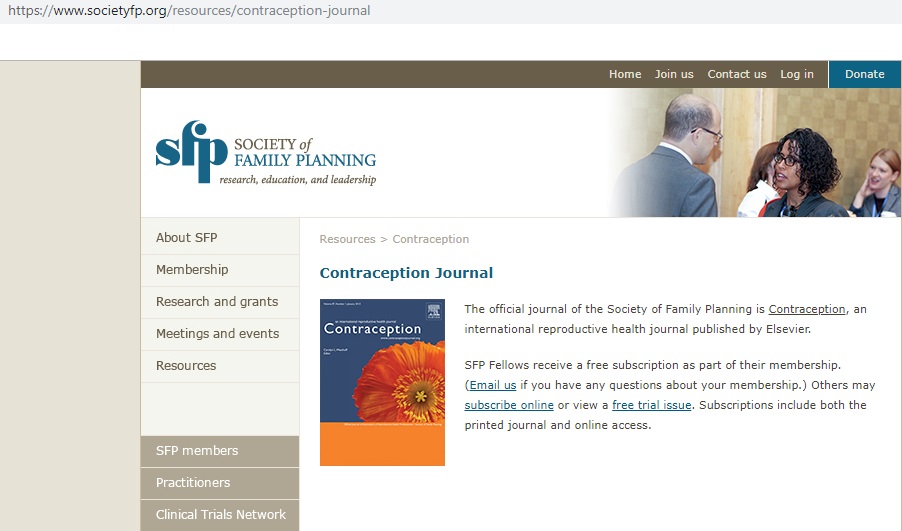
Journal Contraception is the official Journal of the Society of Family Planning (SFP)
- Society of Family Planning (SFP) is part of the TelAbortion study team.
- SFP’s mission supports research on abortion.
- SFP founding member Mark Nichols, MD, was “local principal investigator in the initial Population Council trial investigating mifepristone [abortion pill] for first trimester abortion leading to FDA approval.”
- SFP funds Guttmacher Institute, a former “special affiliate” of Planned Parenthood which promotes self-managed abortion.
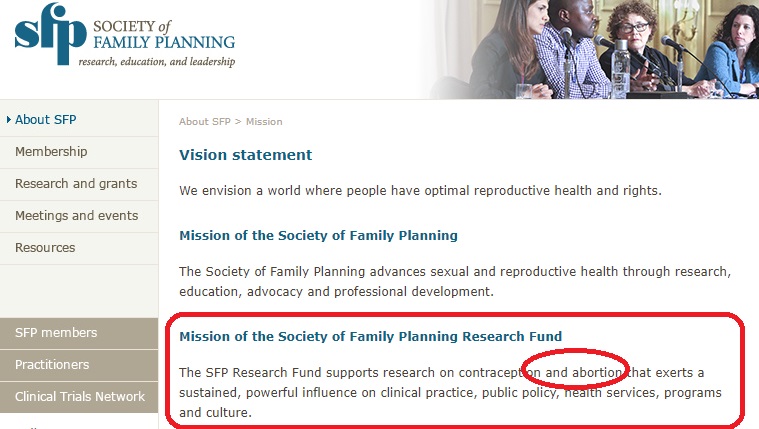
Society of Family Planning mission is abortion research
2. The Association of Reproductive Health Professionals (ARHP) also runs Contraception and was originally an educational arm of Planned Parenthood.
ARHP was founded as clinical education arm of Planned Parenthood under the American Association of Planned Parenthood Physicians (AAPPP) in 1963 by Planned Parenthood president, Alan Guttmacher, and has gone through multiple name changes. Guttmacher was former VP of Eugenics Society and a past Planned Parenthood president.
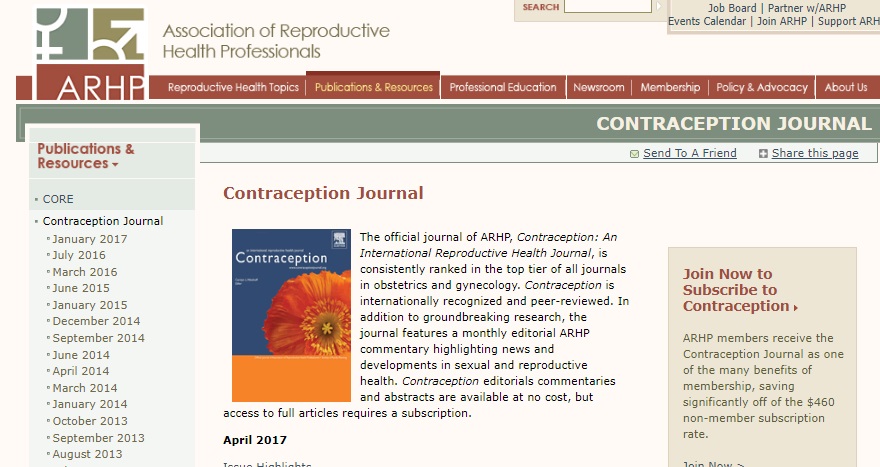
Contraception Journal official Journal of Assoc of Reproductive Health Professionals (ARHP)
Today, the website appears to be undergoing changes. At quick glance, this information no longer appears to be available or has been scrubbed.
A cached version from 2018 and an additional cached versions confirms the history.
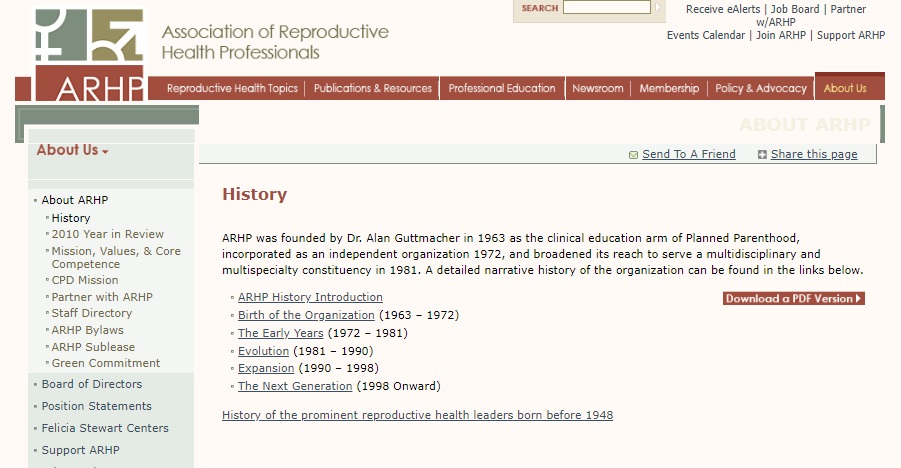
Assoc of Reproductive Health Professionals (ARHP) history founded by Alan Guttmacher
3. The Journal Contraception has repeatedly failed to note past conflicts of interest and is run by abortionists with a vested financial interest in abortion’s expansion.
- Founded in 1970 by Daniel R. Mishell, Jr.
- Has failed to note glaring conflicts of interests in the past, namely that funding came from the David and Lucile Packard Foundation, a major investor in the abortion pill manufacturer, DANCO.
- Editorial board stacked with abortion industry insiders, including a National Abortion Federation board member and members of Population Council (responsible for bringing the abortion pill into US, forming DANCO).
- Current editor is abortionist Dr. Carolyn Westhoff, former director at ARHP, involved in original clinical trials of abortion pill and previously testified in favor of keeping partial-birth abortion legal.
- According to SFP, Westhoff served on board of the Guttmacher Institute and Planned Parenthood.
- Westhoff is Planned Parenthood medical advisor seen on undercover Center for Medical Progress recordings discussing how the aborted baby body parts (including “gonads”) she provides for research are “fresh.”
- Deputy Editor Mitchell D. Creinin is professor at University of California, Davis (UCD), founding member of SFP and involved in original clinical trials of abortion pill. He is a consultant and provides “third-party telephone consults” for abortion pill manufacturer, receives consulting fees and compensation and honorarium for DANCO.
- Creinin behind clinical trial seeking to discredit abortion pill reversal, financed by Packard (Read here and here.)
- Creinin is principal investigator in another clinical trial with Daniel Grossman.
- Editorial Board member Daniel Grossman is professor at University of California, San Francisco (UCSF) which teaches abortion. Funding for some of UC’s abortion programs comes from Packard, including a study published by Journal Contraception which promoted UC’s ability dispense abortion pills on campus.
- Grossman worked with Mexico City Population Council and testified he provides abortions as a consultant to Planned Parenthood Shasta Pacific.
- Grossman serves as liaison member of the PPFA National Medical Committee and a board member of NARAL Pro-Choice America [Editor’s note: Grossman ended his time there on Sept. 26, 2019].
- Grossman was set to conduct a now withdrawn clinical trial for use of abortion pill on non-pregnant women and pharmacy dispensing of pill, both sponsored by UCSF.
- Grossman authored a study of OBGYN attitudes on abortion published in Journal Obstetrics & Gynecology, claiming “among OB-GYNs whose patients have asked for an abortion but who do not now offer it, 28 percent said they would offer the drugs if the FDA lifted its most onerous restrictions on their use.”
- Study’s author Elizabeth Raymond sits on editorial board of the Journal.
- Authors of past Journal studies are deeply embedded in the abortion industry.
- Journal previously published report claiming there is large public interest in expanding distribution of abortion pill by lifting safety requirements on drug, and failed to list Packard funding as a conflict of interest.
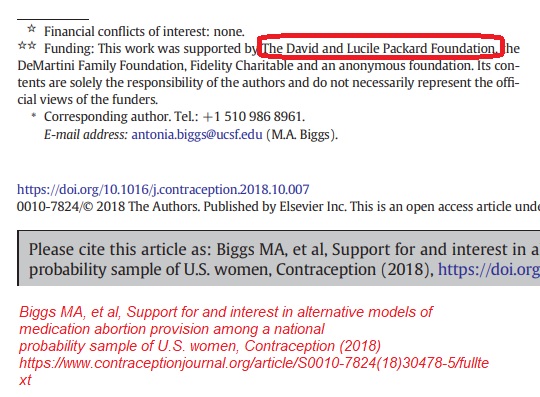
Packard Foundation self managed abortion pill study (Image: 2018 study from Journal Contraception)
Previous Packard-funded studies in this journal unsurprisingly supported the pro-abortion cause, claiming self-managed abortion is safe, and urging the undoing of current FDA safety standards (known as REMS) restricting dispensation of the abortion pill Mifeprex.
Recently, the FDA updated its adverse effects reports through 2018, revealing 24 deaths of women associated with the abortion pill since its September 2000 approval. To date, the report documents nearly 4,200 reported adverse effects, including hospitalization and other serious complications. Under 2016 changes, the drug’s manufacturer, DANCO, no longer has to report non-fatal adverse effects, so we can only imagine what the number really is.
More on who financed the study in an upcoming article.
Editor’s Note: FDA has received reports of serious adverse events in women who took mifepristone. As of June 30, 2021, there were reports of 26 deaths of women associated with mifepristone since the product was approved in September 2000, including two cases of ectopic pregnancy (a pregnancy located outside the womb, such as in the fallopian tubes) resulting in death; and several cases of severe systemic infection (also called sepsis), including some that were fatal. The adverse events cannot with certainty be causally attributed to mifepristone because of concurrent use of other drugs, other medical or surgical treatments, co-existing medical conditions, and information gaps about patient health status and clinical management of the patient. A summary report of adverse events that reflects data through June 30, 2021 is here.
“Like” Live Action News on Facebook for more pro-life news and commentary!







